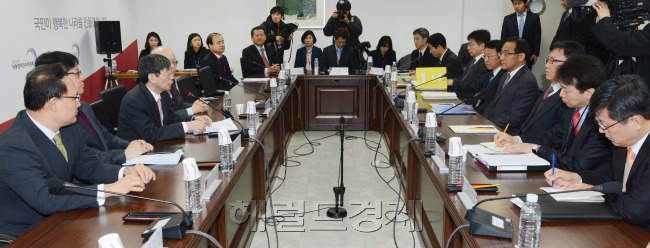Unification Ministry offers broad steps for inter-Korea ties
By Shin Hyon-heePublished : Jan. 16, 2013 - 19:43
The Unification Ministry on Wednesday provided the presidential transition committee with a policy assessment on the cross-border situation and a broad outline of options to help realize President-elect Park Geun-hye’s “trust-building process” with North Korea.
The initiative highlights the need for trust between the two Koreas in achieving reconciliation and denuclearizing the communist country. On the campaign trail, Park vowed to reengage North Korea, resume humanitarian support and eventually expand economic cooperation.
Five other agencies participated in the sixth round of policy briefings including the Prime Minister’s Office, the Ministry for Food, Agriculture, Forestry and Fisheries, Korea Customs Service and the Korea Communications Commission.
“We’re planning to report in a way that helps the transition committee get a clear grip on the current situation of inter-Korea relations and the ministry’s tasks so that they can come up with a good policy blueprint for the next government,” Unification Ministry spokeswoman Park Soo-jin told reporters.
The focal point is whether the incoming leader will resume the long-dormant tour to Mount Geumgang and lift bans on economic activity with the North.
The initiative highlights the need for trust between the two Koreas in achieving reconciliation and denuclearizing the communist country. On the campaign trail, Park vowed to reengage North Korea, resume humanitarian support and eventually expand economic cooperation.
Five other agencies participated in the sixth round of policy briefings including the Prime Minister’s Office, the Ministry for Food, Agriculture, Forestry and Fisheries, Korea Customs Service and the Korea Communications Commission.
“We’re planning to report in a way that helps the transition committee get a clear grip on the current situation of inter-Korea relations and the ministry’s tasks so that they can come up with a good policy blueprint for the next government,” Unification Ministry spokeswoman Park Soo-jin told reporters.
The focal point is whether the incoming leader will resume the long-dormant tour to Mount Geumgang and lift bans on economic activity with the North.

Seoul rolled back state-level assistance after conservative incumbent Lee Myung-bak took office in February 2008 and ended it following the killing of a South Korean tourist in the northern mountain resort in the summer of that year.
In the wake of the regime’s 2010 attacks on the South’s Cheonan corvette and Yeonpyeong Island, Lee imposed the so-called May 24 measures to forbid cross-border trade, investment, travel and other exchanges.
Park’s aides have hinted at easing or phasing out the sanctions. Yun Byung-se, a former deputy foreign minister and member of the transition team’s foreign affairs and defense unit, said last week that related discussions are under way.
But during the briefing, ministry officials were expected to have focused on drawing the big picture of the current inter-Korean ties and the North’s inner workings.
Other issues on the agenda include the lackluster Gaeseong Industrial Complex, a project to raise reunification costs, unification education, unification diplomacy and the resettlement of North Korean defectors.
Meanwhile, the transition committee urged the Prime Minister’s Office to work to make a clean government.
During last year’s presidential campaign, Park focused on making the government more transparent and accountable. She has promised to reduce the privileges and excessive powers of government bodies and to fight corruption by high-level officials.
Park Hyo-chong, head of the transition subcommittee on political affairs, told the officials during their briefing Wednesday that the role of the Prime Minister’s Office was crucial “to fulfill (the president-elect’s) goal of making a clean and reliable government.”
“(The Prime Minister’s Office must) first be free of abuse of power, kickbacks and corruption to set the foundation for new government,” he said.
The prime minister’s role will likely see significant changes under the Park Geun-hye administration.
During her campaign, then-candidate Park pledged to increase the power exercised by the prime minister while reducing that of the president.
As part of the plan, she aims to guarantee the prime minister’s power to nominate cabinet members as stipulated in the constitution, and to bolster the prime minister’s role in drawing up and modifying policies.
The transition team unveiled Tuesday that the Korea Food and Drug Administration, which is currently under the Ministry of Health and Welfare, will be transferred to the Prime Minister’s Office with an elevated status.
The Prime Minister’s Office also reportedly proposed plans to reduce possible inconveniencies caused by the relocation of the cabinet offices to Sejong city.
The government plans to relocate 36 central government offices, including nine ministries and 16 state-run affiliates by 2014 for balanced regional development.
The Prime Minister’s Office, the Agriculture Ministry and the Fair Trade Commission have recently completed moving into the new government complex in Sejong City.
But complaints have already arisen from civic officials about administrative inefficiency due to traveling to and from Seoul for frequent meetings. Observers also report a lack of residential infrastructure such as schools, restaurants and hospitals in the city.
“(The Prime Minister’s Office) needs to work to develop an efficient system to strengthen cooperative and collaborative work between the government offices,” said transition subcommittee head Park.
By Oh Kyu-wook and Shin Hyon-hee
(596story@heraldcorp.com), (heeshin@heraldcorp.com)




![[KH Explains] No more 'Michael' at Kakao Games](http://res.heraldm.com/phpwas/restmb_idxmake.php?idx=644&simg=/content/image/2024/04/28/20240428050183_0.jpg&u=20240428180321)


![[Grace Kao] Hybe vs. Ador: Inspiration, imitation and plagiarism](http://res.heraldm.com/phpwas/restmb_idxmake.php?idx=644&simg=/content/image/2024/04/28/20240428050220_0.jpg&u=)










![[Herald Interview] Xdinary Heroes shoot for the next level with 'Troubleshooting'](http://res.heraldm.com/phpwas/restmb_idxmake.php?idx=642&simg=/content/image/2024/04/29/20240429050745_0.jpg&u=)